By VC
Why do music videos these days often feature police in riot gear and violent repression? Is there an attempt to normalize the concept of a police state in mass media? Two recent and blatant example of this agenda is Jay-Z and Kanye’s video “No Church in the Wild” and Adam Lambert’s “Never Close Our Eyes”. Even though these songs are different in style, their underlying message is similar and is on par with the police state agenda of the world elite. This article will look at the meaning and implications of these videos.

What does Jay-Z have in common with Adam Lambert? At first glance, nothing at all. At second glance, they’re mainstream artists part of the music industry and at some point, even though they differ in style and substance, they are expected to push the agenda of the elite. As we discussed in the article The Transhumanist and Police State Agenda in Pop Music, the entertainment industry is used to promote and normalize the concept of a police state in the eyes of young people. Since the publishing of that article in early 2010, many other artists have featured an oppressive police force and violent repression as part of their works. From performances in live shows to music videos, there is a conscious and constant effort to associate the cool and sexy aura of pop stars with the otherwise abhorrent sight of riot police in a free society.
Two recent examples of the perpetuation of the police state agenda in popular culture are Jay-Z and Kanye West’s music video No Church in the Wild and Adam Lambert’s Never Close our Eyes. In spite of, or perhaps because of, the fact that these songs are two different genres that aim to reach two different markets, they both contribute to the saturation of popular culture with police state imagery. While the authorities are not necessarily portrayed as the “good guys”, they are nevertheless there, as if their presence at any kind of public demonstration is normal. Let’s look at the symbolism and the underlying meaning of these two videos.
The video begins with a guy lighting up a Molotov cocktail in Prague (although some shots appear to be taken in Paris, France).
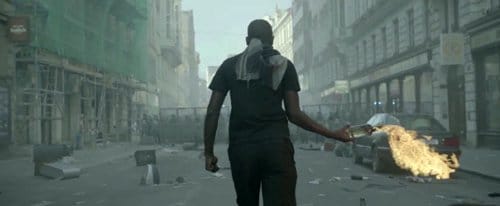 So, right away, we are right in the middle of a confrontation between police in riot gear and young rioters. There is no prior explanation and the rioters have been given no “noble cause” to defend. Even if they do, the viewer is not made aware of it, sort of how mass media relays stories of riots across the world. We’re just seeing senseless violence that is initiated by rioters.
So, right away, we are right in the middle of a confrontation between police in riot gear and young rioters. There is no prior explanation and the rioters have been given no “noble cause” to defend. Even if they do, the viewer is not made aware of it, sort of how mass media relays stories of riots across the world. We’re just seeing senseless violence that is initiated by rioters.
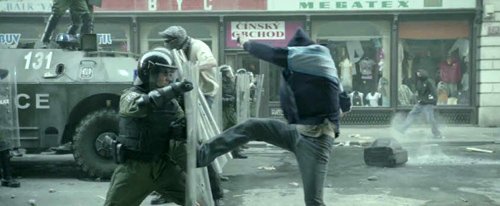 The policemen do not take this crap for long. The young guys charge, violently, giving police an excuse to take out their shiny weapons and retaliate with even more violence. And boy, do they bash on them.
The policemen do not take this crap for long. The young guys charge, violently, giving police an excuse to take out their shiny weapons and retaliate with even more violence. And boy, do they bash on them.
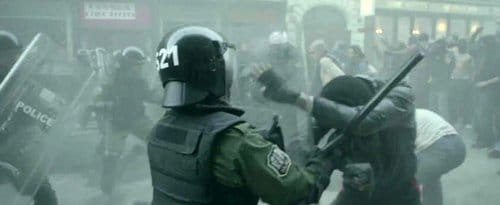
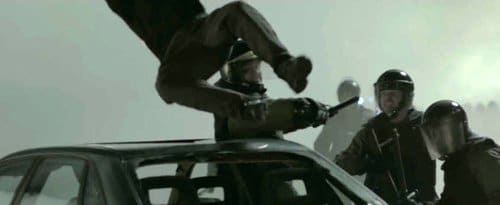
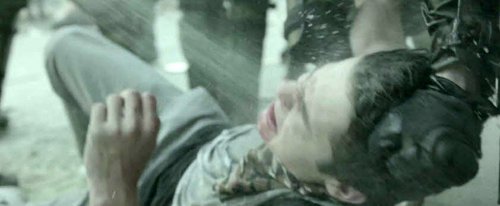 All of these scenes happen in slow motion with a cool beat in the background. As Dave Chappelle once said in his legendary Chappelle Show, everything looks cool in slow motion. Even police clubbing down a young defenseless guy. Is police oppression being glamorized in an indirect way? Here’s a strange juxtaposition of images:
All of these scenes happen in slow motion with a cool beat in the background. As Dave Chappelle once said in his legendary Chappelle Show, everything looks cool in slow motion. Even police clubbing down a young defenseless guy. Is police oppression being glamorized in an indirect way? Here’s a strange juxtaposition of images:
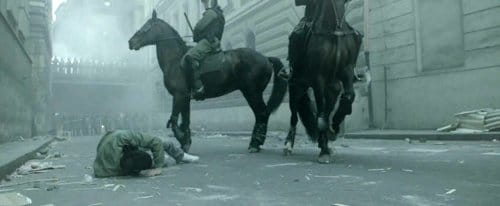 Right after this scene, we see a shot of a statue that gives a deeper meaning to the violence shown.
Right after this scene, we see a shot of a statue that gives a deeper meaning to the violence shown.
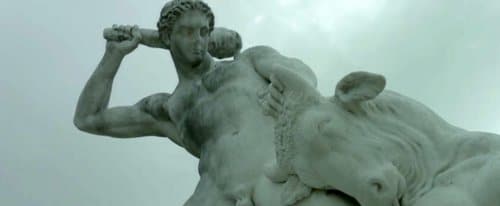 The video features several other dramatic shots of sculptures found in Paris, notably a few from the Arc de Triomphe. As we’ve seen in the series of articles Sinister Sites, sculptures and monuments in major cities are often imbued with the symbolism, mythology and philosophy of the world elite and the secret societies behind it. Since these massive monuments are often commissioned and funded by members of the world elite, it is rather expected that they represent them and their views. In the context of the video, showing these stone monuments implacably overlooking the chaos that is happening on street level is a reminder that the elite is seeing what is happening and probably approves of it. After all, isn’t the Masonic motto of the world elite Ordo Ab Chao (Order Out of Chaos)?
The video features several other dramatic shots of sculptures found in Paris, notably a few from the Arc de Triomphe. As we’ve seen in the series of articles Sinister Sites, sculptures and monuments in major cities are often imbued with the symbolism, mythology and philosophy of the world elite and the secret societies behind it. Since these massive monuments are often commissioned and funded by members of the world elite, it is rather expected that they represent them and their views. In the context of the video, showing these stone monuments implacably overlooking the chaos that is happening on street level is a reminder that the elite is seeing what is happening and probably approves of it. After all, isn’t the Masonic motto of the world elite Ordo Ab Chao (Order Out of Chaos)?
Later in the video, day turns into night … and strobe lights, the kind we usually see in clubs and raves, appear in the riot scene.
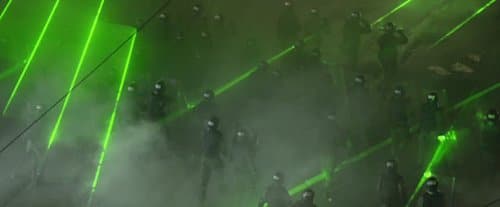 Usually when strobe lights are on, it is because something cool is happening, like music, partying or dancing. That being said, why are they around police in riot gear? Are we trying to confuse young minds with good old-fashioned cognitive dissonance? Just in case you might be confused: Being repressed by police does NOT equals a party.
Usually when strobe lights are on, it is because something cool is happening, like music, partying or dancing. That being said, why are they around police in riot gear? Are we trying to confuse young minds with good old-fashioned cognitive dissonance? Just in case you might be confused: Being repressed by police does NOT equals a party.
At the end of the video, nobody truly wins or loses. Rioters fight back and appear triumphant while police still stand their ground. In other words, nothing has changed and status quo is preserved. An elephant makes an odd appearance in the streets of Paris, reminding the viewers that the “wild” in question is, in fact, our society, where people act like animals and the strongest one wins. In this wilderness, there is no Church, no respite from the savagery, just the stone gaze of statues overlooking the violence. These sculptures represent the puppet masters, those who pull the strings on both sides in order to advance their agenda of a more controlled and repressive society.
Read more http://vigilantcitizen.com/musicbusiness/the-police-state-agenda-in-jay-z-and-kanyes-no-church-in-the-wild-and-adam-lamberts-never-close-our-eyes/

What does Jay-Z have in common with Adam Lambert? At first glance, nothing at all. At second glance, they’re mainstream artists part of the music industry and at some point, even though they differ in style and substance, they are expected to push the agenda of the elite. As we discussed in the article The Transhumanist and Police State Agenda in Pop Music, the entertainment industry is used to promote and normalize the concept of a police state in the eyes of young people. Since the publishing of that article in early 2010, many other artists have featured an oppressive police force and violent repression as part of their works. From performances in live shows to music videos, there is a conscious and constant effort to associate the cool and sexy aura of pop stars with the otherwise abhorrent sight of riot police in a free society.
Two recent examples of the perpetuation of the police state agenda in popular culture are Jay-Z and Kanye West’s music video No Church in the Wild and Adam Lambert’s Never Close our Eyes. In spite of, or perhaps because of, the fact that these songs are two different genres that aim to reach two different markets, they both contribute to the saturation of popular culture with police state imagery. While the authorities are not necessarily portrayed as the “good guys”, they are nevertheless there, as if their presence at any kind of public demonstration is normal. Let’s look at the symbolism and the underlying meaning of these two videos.
No Church in the Wild
No Church in the Wild has rather profound philosophical implications. The lyrics are of course up for interpretation, one of which is that the song is a rejection of religious dogma to embrace a more humanist (and maybe hedonistic) way of life. The title of the song itself is a figurative way of saying that religious institutions such as the Church are unnecessary human constructs that are not found in nature. That being said, the video consists of lovely footage of trees and streams … oh no, actually the video is about a bunch of dudes getting beat up by riot police. Why? What’s the relationship to the lyrics? I am not totally sure, but the video is pretty much five straight minutes of angry rioters and violent police repression. A great way to desensitize young people to the concept of police state.The video begins with a guy lighting up a Molotov cocktail in Prague (although some shots appear to be taken in Paris, France).

In the video, the rioters do not appear to have a valid cause and they are clearly portrayed as the aggressors.

The rioters are angry and aggressive. Without a back story describing the source of their grief, it is rather hard to identify with them.

This guy gets clubbed back to sanity.

This one gets his feet swiped off to fall on his back while other policemen apparently laugh at him.

This one gets a face full of tear gas at point blank range, a lot like student protestors at UC Davis. I am pretty sure that this is NOT the way the user manual recommends using tear gas.

This guy got chased down by police cavaliers and got smacked right on the head with a nightstick.

Right after we see a rioter get clubbed down by a policeman, we see a shot of a statue of Theseus clubbing the Minotaur. This story from Greek mythology esoterically represents the slaying of man’s “lower animal” side in order to achieve illumination. Is the video saying that the rioting masses are the “lower animal” side of society that needs to be tamed (or slayed) by the illuminated?
Later in the video, day turns into night … and strobe lights, the kind we usually see in clubs and raves, appear in the riot scene.

Police in riot gear surrounded by strobe lights. They are really trying to associate police with stuff young people enjoy.
At the end of the video, nobody truly wins or loses. Rioters fight back and appear triumphant while police still stand their ground. In other words, nothing has changed and status quo is preserved. An elephant makes an odd appearance in the streets of Paris, reminding the viewers that the “wild” in question is, in fact, our society, where people act like animals and the strongest one wins. In this wilderness, there is no Church, no respite from the savagery, just the stone gaze of statues overlooking the violence. These sculptures represent the puppet masters, those who pull the strings on both sides in order to advance their agenda of a more controlled and repressive society.
Read more http://vigilantcitizen.com/musicbusiness/the-police-state-agenda-in-jay-z-and-kanyes-no-church-in-the-wild-and-adam-lamberts-never-close-our-eyes/